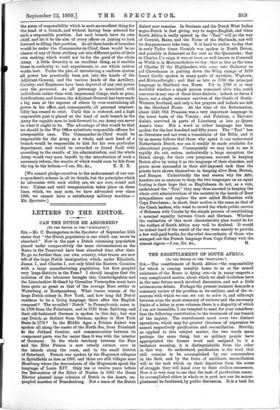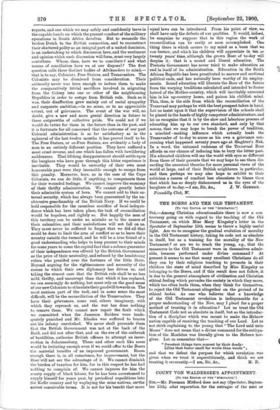THE RESETTLEMENT OF SOUTH AFRICA.
(TO TUE EDITOR OP THE "SPECTATOR.")
SIE,—The resettlement of South Africa—the responsibility for which is coming sensibly home to us as the armed resistance of the Boers is dying out—is in many respects a very complicated matter, about which we shall doubtless have in the near future much involved discussion, and not a little acrimonious debate. Perhaps the present moment demands a summary review of the problem in its outlines, and of the re- sources with which we can set out to solve it, and although between even the most summary of reviews and the necessary limits of a letter in your columns there is a disparity of which I am not insensible, I am tempted to send for your considera- tion the following contribution to the treatment of one branch of the inquiry. The resettlement must cover two distinct operations, which may for greater clearness of expression be named respectively pacification and reconciliation. Strictly, as applied to this subject matter, the two words mean perhaps the same thing, but as military people have appropriated the former word and assigned to it a technical meaning, it is distinguishable from the other in that way. So understood, pacification is the work that still remains to be accomplished by our commanders in the field, and by the force of antithesis reconciliation will be the task which on their departure from the scene of struggle they will hand over to their civilian successors. Now it is very easy to see that the task of pacification canno be accomplished either in whole or in part, nor can its accom- plishment be furthered, by public discussion. It is a task for
experts, and one which we may safely and confidently leave in the capable hands on which the present conduct of the military operations in South Africa devolves. But to reconcile the broken Dutch to the British connection, and to reconstruct their shattered polity as an integral part of a united dominion, is an undertaking to which discussion here, and the sentiment and opinion which such discussion will form, must very largely contribute. Whom, then, have we to conciliate ? and what means of conciliation have we at our disposal? The first question calls three distinct bodies of Afrikanders to mind,— that is to say, Colonists, Free Staters, and Transvaalers. The Colonists may be dismissed from consideration. Their animosity never was keen enough to induce them to make the comparatively trivial sacrifices involved in migrating from the Colony into one or other of the neighbouring Republics in order to esdape from British rule. Such as it was, their disaffection grew mainly out of racial sympathy and corporate ambition,—in no sense, or to no appreciable extent, out of grievances. The event of the war will, no doubt, give a new and more genial direction in future to these outgrowths of collective pride. We could not if we would do better for them in the future than in the past, and it is fortunate for all concerned that the outcome of our past Colonial administration is so far satisfactory as in the upheaval of the last twelve months it has proved itself to be, The Free Staters, or ex-Free Staters, are evidently a body of men in an entirely different position. They have suffered a most cruel reverse, and one which has fallen with bewildering suddenness. That lifelong disappointment should settle upon the burghers who have gone through this bitter experience is inevitable. They would be unworthy of their own most honourable past were they insensible enough to escape from this penalty. Moreover, here, as in the case of the Cape Colonists, we can do little, if anything, to compensate them for their wounded feelings. We cannot improve the economy of their thrifty administration. We cannot greatly better their admirable system of laws. We cannot add to their ex- ternal security, which has always been guaranteed by the un- obtrusive guardianship of the British Navy. If we could be held responsible for the causeless sacrifice of local indepen- dence which has here taken place, the task of reconciliation would be hopeless, and rightly so. But happily the men of this territory can be under no mistake as to the source of their calamities, and their maledictions will not fall on us. They must never be suffered to forget that we did all that could be done to limit the area of conflict so as to leave their country outside the turmoil, and he will be a true friend of a good understanding who helps to keep present to their minds for some years to come the capital fact that a solemn guarantee of their independence was offered by the British Government as the price of their neutrality, and refused by the headstrong rulers who presided over the fortunes of the little State. Beyond arguing for the righteousness and necessity of the course to which their own diplomacy has driven us, and taking the utmost care that the British rule shall be no less mild, thrifty, and uncorrupt than that which it has replaced, we can seemingly do nothing, but must rely on the good sense of our new Colonists to stimulate their goodwill towards us. The most anxious part of the task, and in some sense the most difficult, will be the reconciliation of the Transvaalers. They have their grievances, some real, others imaginary, with which they reproach us, and the war has done nothing to remove them. We cannot now repair the fault which we committed when the Jameson Raiders were inade- quately punished and Mr. Rhodes was suffered to brazen out his infamy unrebuked. We never shall persuade them that the British Government was not at the back of the Raid, and did not after that, and on the eve of the outbreak of hostilities, authorise British officers to attempt an insur- rection in Johannesburg. These and other such like sores would be irritating enough even if we could offer to the Boers the material benefits of an improved government. Room enough there is, in all conscience, for improvement, but the Boer will not see the advantage of it. We cannot diminish the burden of taxation for him, for in this respect he has had nothing to complain of. We cannot improve for him the scanty supply of black labour, for he has been accustomed to supply himself for years past, by periodical expeditions into the Kaffir country and by waylaying the mine natives, ozethe easiest conceivable terms. It is not for his benefit that more
equal laws can be introduced. From his point of view, we shall have only the defects of our qualities. It would, indeed, be sanguine to suppose that in this region the work of reconciliation can be easily or soon accomplished. One thing there is which occurs to my mind as a boon that we can bestow, and which his children will appreciate in ten or twenty years' time, although the grown Boer of to-day will despise it: that is a sound and liberal education. The Pretoria Government has never tried to make education an end in itself of its administration. Education in the South African Republic has been prostituted to narrow and sectional political ends, and has naturally been worthy of its employ- ments. Sound education will liberate the Boer of the future from the warping traditions calculated and intended to foster hatred of the Mother-country, which will inevitably surround him in his up-country home, and poison his childish mina. This, then, is the side from which the reconciliation of the Transvaal may perhaps be with the best prospect taken in hand. Let us insist upon it that the supervision of the schools shall be placed in the hands of highly competent administrators, and let us recognise that it is by the slow and laborious process of educating him up to our own standard, and only by that means, that we may hope to break the power of tradition, a mischief - making influence which actually leads the Transvaaler of to-day to nurse as his own a grievance con- cerning what happened seventy years ago at Slaghter's Nek. In a word, the untamed rudeness of the Transvaal Boer affords us our chance of inducing him to bury the bitter past. His educated children will see the world with eyes so different from those of their parents that we may hope to see them dis- carding the ancestral theories for more personal views of the world at large, and of their British neighbours in particular, and then perhaps we may also hope to exhibit to their criticism a course of conduct less obnoxious to blame than that which has so deeply dishonoured us in the eyes of the burghers of to-day.--I am, Sir, &c., J. W. GORDON.
Piccadilly Club, W.







































 Previous page
Previous page